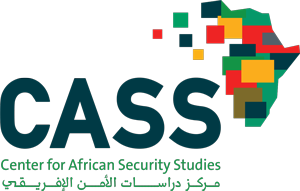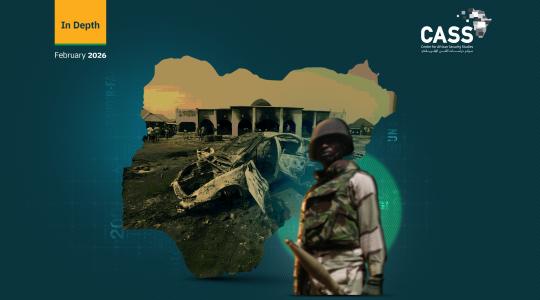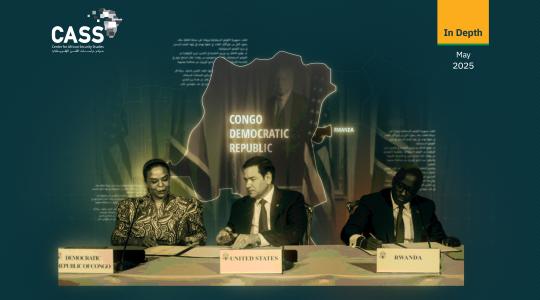On May 6, some eight million voters headed to 25,000 polling stations across Chad to elect a president. Three days later, sources close to candidate Succes Masra announced that he had won with 59% of the vote, while incumbent Mohamed Idriss Déby had come second with 14%. However, on May 10, the electoral commission a starkly different result: Déby, the president of the country’s Transitional Council, had won with a 61.3% majority, while Masra had received just 18% of the vote. Former Prime Minister Bahimi Badaki received 16%.
Why were these elections important?
The election was a landmark moment in Chad for several reasons, both domestic and international. It was the first poll since the military had grabbed power in the wake of the death of Idriss Déby, the new president’s father, in April 2021. The 18-month term of the resulting National Transitional Council, headed by the late president’s son Mohamed Idriss Déby, had been extended for various reasons.
The election also took place against the backdrop of the catastrophic ongoing conflict in neighboring Sudan. The resulting influx of Sudanese refugees into Chad is a highly sensitive issue, given the two countries’ history of supporting rebel movements on each other’s territories, particularly in the vast Darfur region of western Sudan, which was the focus of Rapid Support Forces (RSF) attacks against civilians—including from the Zaghawa tribe from which the Déby family hails.
Despite this, there are reports that Déby has allowed the United Arab Emirates to supply arms to the RSF via N’Djamena airport, defying pressure by Zaghawa tribal elders to support the RSF’s rivals in Darfur instead.
The poll also took place against the backdrop of a complex domestic situation in Chad, where the Front for Change and Concord in Chad (FACT) in August 2023 resumed its armed struggle against the Chadian army, carrying out several attacks in the northern region of Kouri Bougoudi, where Chad’s largest gold mines are located. This was part of a general deterioration in security across the Sahel and West Africa, as jihadists, separatist armed groups and criminal gangs gain momentum in the region.
Finally, the elections followed the killing of Yaya Dillo Djérou, leader of the opposition Socialist Party Without Borders and cousin of now-President Déby, during a military raid at the party’s headquarters on February 28. Security agencies had accused him of organizing an attack on the national intelligence agency’s headquarters the night before his death, after one of his supporters had been arrested on charges of attempting to assassinate the Chief Justice of the Supreme Court. Dillo’s death again highlighted the internal ruptures tearing apart the Zaghawa tribe, as well as Déby’s opposition to the emergence of any strong leader or faction within the tribe capable of contesting his own leadership.
What the Results Mean
The presidential elections represented a crossroads for Chad’s politics, both domestically and in the region. On the one hand, the passing of this crucial phase could help stabilize the country and create a basis for building the Chadian economy, while on the other, the vote may prove to be the trigger for new armed rebellions and political turmoil, with implications for the entire Sahel region.
The first case is possible, if a government is formed that works earnestly to overcome the towering economic obstacles facing the country and provide services to the population, which could help ease domestic tensions. The second scenario, in which the election results exacerbate existing tensions, can be avoided—but only if the government favors the path of domestic consensus.
The election also deepened the hold of the Zaghawa tribe (and Déby’s family) on power. However, this may spur the rise of armed rebel movements backed by the political opposition or neighboring countries, adding to the challenges the regime faces in bringing stability and development to Chad. This would raise the specter of further political unrest, tyranny and repression, following in the footsteps of other countries in the Sahel and the Sahara which have experienced political, social and economic conflicts since their independence, complicating the process of democratic transition.
It is likely that Chad’s foreign relations will also take a new trajectory moving forward. Indeed, the impact of this election on the region’s politics may last years, especially given that Chad is the last stronghold of the U.S. and France in the Sahel region following a string of recent military coups in Burkina Faso, Mali and Niger. Chad is surrounded by countries suffering from conflicts and experiencing open Russian intervention, notably Sudan, the Central African Republic, Niger and Libya. The increasing security and political challenges across the Sahel also exacerbate international competition between various actors on the ground.
The U.S. sees Chad as its last outpost in the Sahel, and may support President Déby out of necessity, in order to maintain domestic calm in Chad and avoid the scenario of other countries that have seen anti-Western coups (Mali, Burkina Faso, and Niger).
Similarly, France is likely to support Déby as the country’s most powerful general, who along with his family, controls the levers of power. Despite turbulence in relations between Chad and its former colonial ruler, they are unlikely to collapse, as Chad is the last country in the Sahel-Sahara region where France has a strong military presence, one it will seek to preserve.
Given all this, it seems the Chadian president appears to realize his country’s political leverage, something he has been using to build closer ties to Russia. Déby visited Moscow in January 2024, signing a deal under which Russia will supply weapons to the Chadian army. He also met President Vladimir Putin, indicating that the relationship could develop further, especially given the presence of Russian military headquarters in the neighboring Central African Republic.
This gives Russia an ideal opportunity to expand its influence in Chad at the expense of Western powers, in return for refraining from supporting rebel groups in southern Chad and for participating in the fight against jihadist groups in the Lakes region on the border with Nigeria. Russia is seeking to exploit the security gap and political tensions to strengthen its relations with Chad and across the Sahel.
Déby is likely to continue his cooperation with the UAE, keeping military support flowing to the RSF in Sudan, in exchange for financial and economic rewards. This could develop into military relations, were Chad to allow the UAE to build a base for its forces in Chad, as an alternative to the UAE base that Niger’s Presidents Mahamadou Issoufou and Mohamed Bazoum had both declined to authorize it to build.
Chad is also likely to leverage the African Union’s desire for stability in Chad to achieve its demands for economic assistance and funding for development projects, both aimed at maintaining stability in the country. Arguably, it has a strong case: fragility and unrest could result in outflows of refugees and the rise of rebel groups, with significant impacts for the surrounding countries.




